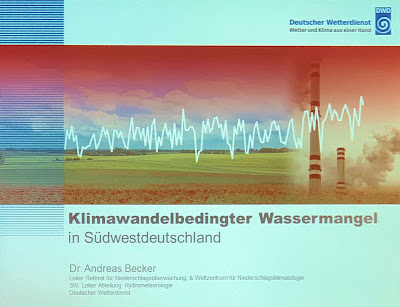Droughts and heavy rainfall are consequences of the climate change we are experiencing. These two weather phenomena are increasingly observed globally.
Last week, Red Baron attended two talks as part of the Freiburger Umweltgespräche (Freiburg Environmental Talks), held at the local Jazz House.
In his presentation about climate change and water shortage in Germany's southwest, Dr. Andreas Becker of the German Meteorological Service presented measured "hard" data but refused to paint horror scenarios.
Here is a global map of greenhouse gas emissions, illustrating the expected pattern. The consumption-friendly Western countries and the populous economies of China and India stick out.
Dr. Becker presented the increase in CO2 concentration in the air from a measuring station at the Mount Loa Observatory in Hawaii, which serves as the world's reference point. Recently, a record "air mark" of 415 ppm was exceeded.
"As recently as 1910, atmospheric CO2 stood at 300 ppm – higher than it had been for some 800,000 years at least* – but jumped up another 100+ ppm over the next century as pollution levels skyrocketed."
*Measured in drill cores from ice layers
For the future, Dr. Becker presented two scenarios to choose from: If the signatories of the Paris Climate Agreement take active countermeasures against CO2 emissions, a value of 400 ppm could be capped by 2100. Taking no measures will result in a CO2 concentration of 1370 ppm in the same year.
Regarding the total amount of rain in Baden-Württemberg, the region appears to be well off.
On a global level, however, observed climatic changes are dramatic. The ice around the North Pole is melting rapidly, as shown by the decrease in the surface covered by ice from 1980 to 2018. The albedo of the white snow, which reflects solar radiation, becomes lower, further heating up the sea, and the cold mass of ice diminishes.
At first look, these effects alone may not seem of great concern, but to say it with a quotation from Schiller's drama Wallenstein: The curse of an evil deed is propagating and will bring forth evil. In fact, climatologists have recently observed a weakening of the powerful jet stream, with the temperature difference and gradient between the Arctic and equatorial regions becoming smaller. This leads to stable and stationary weather conditions around the globe, causing either persistent rain or long periods of heat and drought - precisely the climate that Germany's southwest had lived through last year.
Dr. Becker stated that 2018, as shown on the slide, with a mean temperature of more than 3 degrees too warm and 40% less precipitation than the mean, was still an exceptional year.
Again, while the total amount of rain from April to October shows no decreasing trend, air temperatures increase due to the increasing sunshine duration.
The drought in the region is caused by increased water evaporation at higher temperatures. It is further accentuated by warm and dry southern winds streaming through the Burgundische Pforte (Belfort Gap) along the Rhine Valley and sweeping the water vapor.
The balance between precipitation and evaporation looks particularly grim for
the region around Berlin.
Professor Markus Weiler's talk was somewhat technical and concerned with heavy rainfall and town flooding. I retained only one of his slides, showing a persistent local depression, i.e., a rain cell of only 10 kilometers in diameter, but stationary for one hour. It received precipitation of around 50 mm, resulting in flooding that destroyed the nearby town of Braunsbach.
As early as 2008, Red Baron reported on climate change at a Stammtisch of the Freiburg-Madison Gesellschaft. I further accentuated the topic in 2014 and 2015, harping on the Energiewende (energy system transformation).
We cannot escape. Climate change is real!
Professor Markus Weiler's talk was somewhat technical and concerned with heavy rainfall and town flooding. I retained only one of his slides, showing a persistent local depression, i.e., a rain cell of only 10 kilometers in diameter, but stationary for one hour. It received precipitation of around 50 mm, resulting in flooding that destroyed the nearby town of Braunsbach.
As early as 2008, Red Baron reported on climate change at a Stammtisch of the Freiburg-Madison Gesellschaft. I further accentuated the topic in 2014 and 2015, harping on the Energiewende (energy system transformation).
We cannot escape. Climate change is real!
**











No comments:
Post a Comment